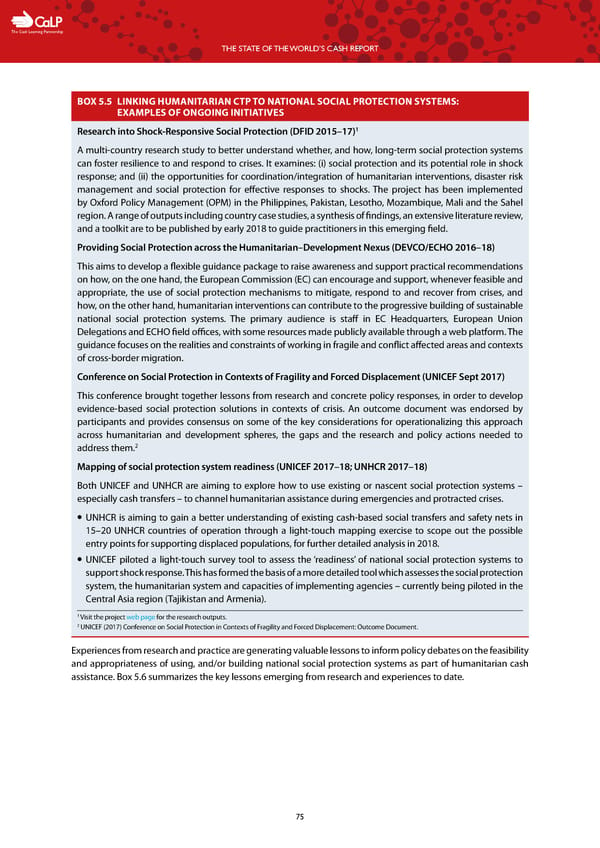C The Cash Learning Partnership THE STATE OF THE WORLD’S CASH REPORT BOX 5.5 LINKING HUMANITARIAN CTP TO NATIONAL SOCIAL PROTECTION SYSTEMS: EXAMPLES OF ONGOING INITIATIVES 1 Research into Shock-Responsive Social Protection (DFID 2015–17) A multi-country research study to better understand whether, and how, long-term social protection systems can foster resilience to and respond to crises. It examines: (i) social protection and its potential role in shock response; and (ii) the opportunities for coordination/integration of humanitarian interventions, disaster risk management and social protection for effective responses to shocks. The project has been implemented by Oxford Policy Management (OPM) in the Philippines, Pakistan, Lesotho, Mozambique, Mali and the Sahel region. A range of outputs including country case studies, a synthesis of findings, an extensive literature review, and a toolkit are to be published by early 2018 to guide practitioners in this emerging field. Providing Social Protection across the Humanitarian–Development Nexus (DEVCO/ECHO 2016–18) This aims to develop a flexible guidance package to raise awareness and support practical recommendations on how, on the one hand, the European Commission (EC) can encourage and support, whenever feasible and appropriate, the use of social protection mechanisms to mitigate, respond to and recover from crises, and how, on the other hand, humanitarian interventions can contribute to the progressive building of sustainable national social protection systems. The primary audience is staff in EC Headquarters, European Union Delegations and ECHO field offices, with some resources made publicly available through a web platform. The guidance focuses on the realities and constraints of working in fragile and conflict affected areas and contexts of cross-border migration. Conference on Social Protection in Contexts of Fragility and Forced Displacement (UNICEF Sept 2017) This conference brought together lessons from research and concrete policy responses, in order to develop evidence-based social protection solutions in contexts of crisis. An outcome document was endorsed by participants and provides consensus on some of the key considerations for operationalizing this approach across humanitarian and development spheres, the gaps and the research and policy actions needed to 2 address them. Mapping of social protection system readiness (UNICEF 2017–18; UNHCR 2017–18) Both UNICEF and UNHCR are aiming to explore how to use existing or nascent social protection systems – especially cash transfers – to channel humanitarian assistance during emergencies and protracted crises. — UNHCR is aiming to gain a better understanding of existing cash-based social transfers and safety nets in 15–20 UNHCR countries of operation through a light-touch mapping exercise to scope out the possible entry points for supporting displaced populations, for further detailed analysis in 2018. — UNICEF piloted a light-touch survey tool to assess the ‘readiness’ of national social protection systems to support shock response. This has formed the basis of a more detailed tool which assesses the social protection system, the humanitarian system and capacities of implementing agencies – currently being piloted in the Central Asia region (Tajikistan and Armenia). 1 Visit the project web page for the research outputs. 2 UNICEF (2017) Conference on Social Protection in Contexts of Fragility and Forced Displacement: Outcome Document. Experiences from research and practice are generating valuable lessons to inform policy debates on the feasibility and appropriateness of using, and/or building national social protection systems as part of humanitarian cash assistance. Box 5.6 summarizes the key lessons emerging from research and experiences to date. 75
 The State of the World's Cash | Full Report Page 76 Page 78
The State of the World's Cash | Full Report Page 76 Page 78